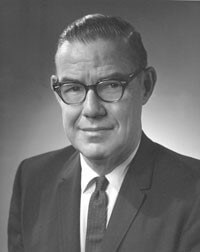
Governor Robert E. Smylie

Born October 31, 1914, Marcus, Iowa
Died July 17, 2004, Boise, ID
Robert Eben Smylie was born Oct. 31, 1914 in Marcus, Iowa. He graduated from high school in Cresco, Iowa in 1932, at the height of the Great Depression. Because an uncle in Caldwell, Fern Cole, offered him a place to live, he came to Idaho to attend the College of Idaho (now Albertson College of Idaho).
Active in football, debate, student government, and the yearbook, he graduated in 1938, hitchhiking back and forth to Iowa in the summers. He then attended George Washington University law School, simultaneously clerking at the Washington, D.C. law firm of Covington Burling and working as a U.S. Capitol policeman. He received his law degree in 1942, second in his class. While working in a Washington law firm after graduation, he met Lucille Irwin. He described their marriage, on December 4, 1943, as “the most important and wonderful thing I ever did.”
He then served as a lawyer in the Coast Guard, stationed in Philadelphia and the Philippines, during World War II. In 1946, he accepted a job as Deputy Attorney General of Idaho. The next year, when the incumbent attorney general died, Gov. C. A. Robins appointed Smylie to the position. He was elected in his own right in 1950.
Four years later, Smylie ran for and was elected to the first of three terms as governor. In his 12 years of service, his work ethic and his political savvy made possible remarkable achievements for the state and its people. He was especially proud of how the administration of government developed during his terms such as the provision of a modem highway system, agencies and divisions of government, the creation of a state parks system, and adoption of a sales tax.
As part of efforts to improve the quality of state government, a professional and apolitical state personnel system was established as was the Public Employee Retirement System of Idaho.
Through criticized for excessive travel outside of the state, these efforts brought many things to Idaho, including the gift of Harriman State Park to the people of Idaho.
In addition, through his leadership in the National, Western, and Republican Governors Associations and participation in official trips abroad he gave Idaho far greater national prominence than it had previously achieved. He was gifted at connection with the people of Idaho and which led to his reelection to three terms. But even more importantly, there was never in his 20 years of elective service the slightest whisper of a scandal.
Smylie was defeated in the Republican gubernatorial primary in 1966, but he felt vindicated when, in the general election that year, voters adopted a permanent sales tax, the basis of modern Idaho’s balanced budgets and stable government. The people rejected the messenger but accepted his message.
After his defeat, the Smylies remained in Boise and the former governor returned to the practice of law. He returned to his alma mater as a member of the College of Idaho board of trustees and served for a time as acting president. The archives at the college, where his own papers are housed, is named for him.
Other awards have come his way: honors from the Idaho Commission on the Arts, the Idaho Humanities Council, the Idaho State Historical Society (whose professionalization he accomplished almost single-handedly), FUNDSY, and the state of Idaho, which has named the Department of Parks and Recreation’s headquarters for him.
Throughout his life, Bob Smylie always found time for family. He quietly took care of people who needed him. He became the father figure for his nieces who had lost their father early in life. In private practice of law, he joked that he always had to care of widows and orphans. He always had cases where he would work for little or nothing to help someone who had legal trouble when he could have been doing some lucrative corporate or government work.
He donated much of his time in retirement to giving back to Idaho. He served many different charities and worked tirelessly on the Idaho Centennial Commission. He quietly volunteered at the Care Unit at Mercy Hospital. In the family, he took care of everyone if they were sick or in need of legal advice. He didn’t want ostentatious displays of wealth; instead he gave thousands of dollars to the charities he loved.
Send a Message to Parks and Rec
For other after hours park related emergencies (i.e. irrigation issues, restrooms), please call (208) 489-6640.